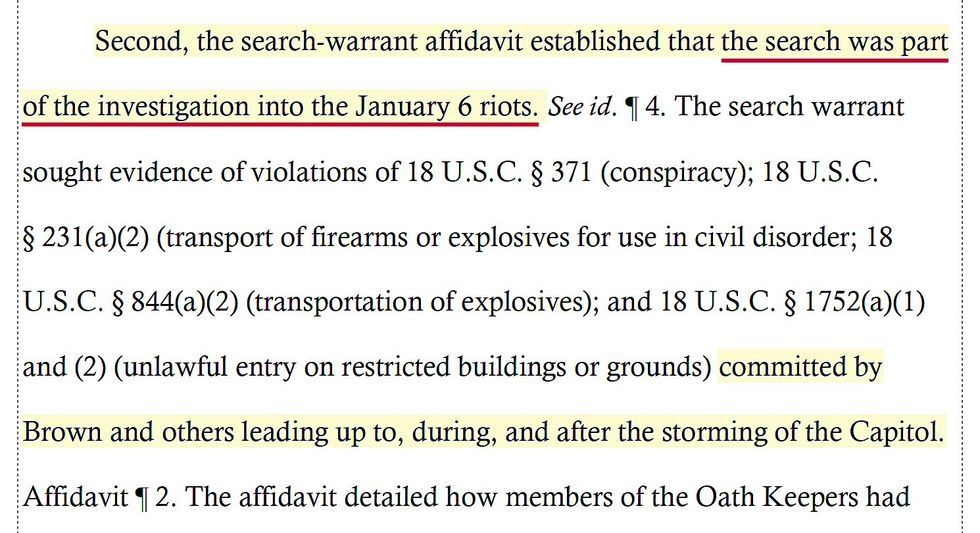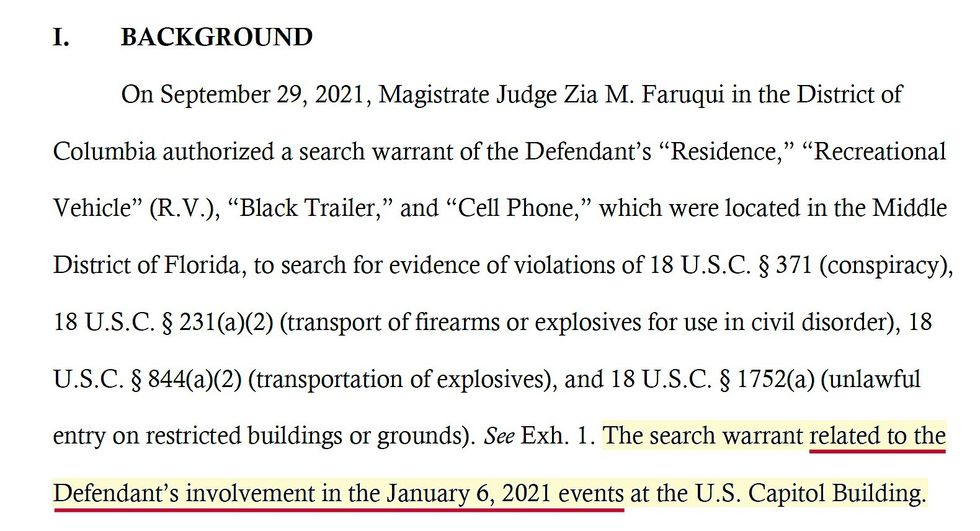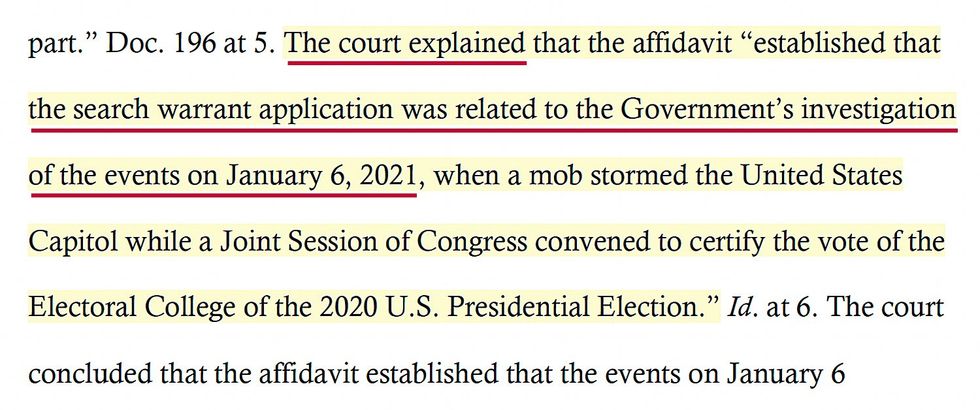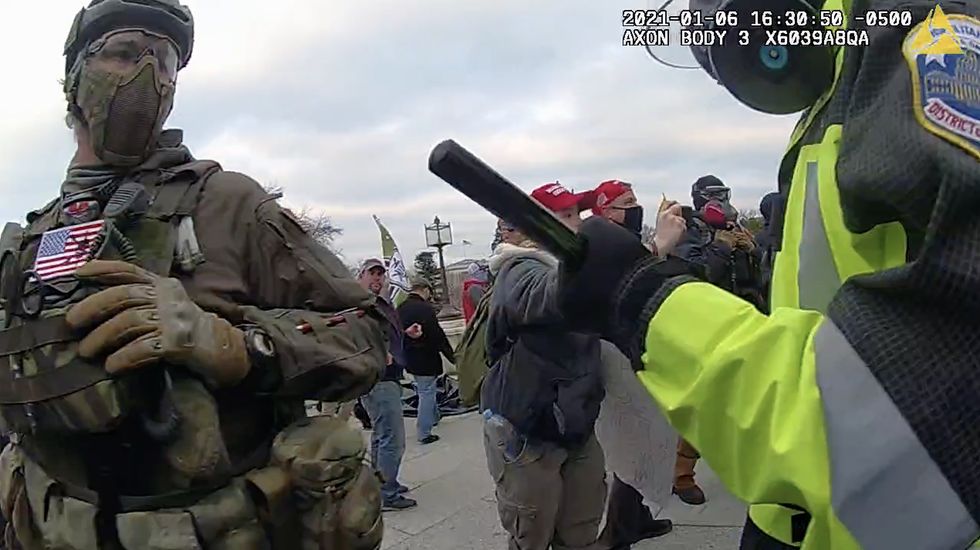
Oath Keeper Jeremy Brown (left) on his way from the Ellipse to the U.S. Capitol on Jan. 6, 2021. At right is Florida Oath Keepers leader Kelly Meggs. Photo by Luke Coffee

Defense attorney Carolyn Stewart demanded Brown’s release from prison, saying his two criminal cases are both covered by a pardon from President Trump.
The U.S. Department of Justice acknowledged in court filings that Oath Keeper Jeremy Brown’s Florida weapons-possession case was directly related to Jan. 6, leaving bewilderment among his supporters as to why he remains behind bars even after a Jan. 6 presidential pardon.
Carolyn Stewart, Brown’s attorney, said these court filings are ample evidence to prove that the DOJ, Brown’s defense team, and a U.S. district judge all agreed that the Florida case that sent Brown to prison for more than seven years was a Jan. 6 case.
“Done. Fully baked,” Stewart told Blaze News. “Yet DOJ has prevented Jeremy’s release under President Trump’s pardon.”
'This isn’t rocket science.'
Stewart called on the acting U.S. attorney general to order Brown’s release from U.S. Bureau of Prisons custody.
“President Trump’s order for release of those incarcerated for J6-related charges was blocked by shadowy D.C. actors on Jan. 20,” Stewart said. “These unidentified actors decided outside legal discourse to keep Jeremy incarcerated and move him to Kentucky and now BOP in FCI Atlanta.”
If the U.S. attorney in Tampa won’t “do the right thing,” Stewart said, “then the acting U.S. attorney general or his deputy must order the BOP to release Jeremy Brown. The BOP is under DOJ. DOJ is under the U.S. attorney general. This isn’t rocket science.”

The July 2022 and January 2024 court filings mean the Florida case is covered by President Donald J. Trump’s Jan. 6 pardon proclamation and that Brown should be freed immediately, Stewart said.
After President Trump announced more than 1,500 Jan. 6 pardons hours after being sworn in as the 47th president of the United States, Brown fully expected to be released from the District of Columbia jail.
He was preparing to leave and meet his mother and girlfriend, who waited outside. Jail staff reversed course and told him he would not be released after all due to the Florida conviction, Brown said in a statement.
Brown was taken from D.C. by U.S. Marshals and deposited at the Grayson County Detention Center in Leitchfield, Ky. Brown told his girlfriend, Tylene Aldridge, that he was in a room with 15 other men and had to sleep on a mat next to the toilet. After a few days, Brown was moved again, this time to FCI Atlanta, a low-security federal prison in northern Georgia.

Stewart pointed the finger at Roger Handberg, U.S. attorney for the Middle District of Florida, a Biden appointee who assumed the position in September 2022.
“DOJ has to clean its laundry: the fed U.S. attorney (Biden appointee who persecuted Jeremy) for the FL Middle Distr. is ignoring the J6 pardon,” Stewart posted on X Jan. 24.
Blaze News asked the U.S. Attorney’s Office in Tampa if it had made a legal determination that Brown must be kept in custody because the Florida case was not a Jan. 6 case.
“No further information regarding the Middle District of Florida case is available at this time,” replied William Daniels, public affairs officer, in an email to Blaze News.

The new U.S. attorney for the District of Columbia, Edward Martin Jr., filed a motion to dismiss the D.C. case with prejudice.
The D.C. and Tampa criminal cases lodged against Brown both sprang from an FBI search of his home, an RV, and a trailer parked on his property in Tampa.
On April 7, 2023, Brown was sentenced to 87 months in prison by Senior U.S. District Judge Susan Bucklew on six criminal counts that included possessing a short-barrel rifle and shotgun, possession of explosive grenades, improper storage of explosive grenades, and willful retention of a national defense document. Brown was acquitted of four other counts. Bucklew was appointed to the bench in 1993 by President Bill Clinton.
Brown’s supporters see the government’s refusal to release Brown as ongoing persecution because he refused to spy on the Oath Keepers as an informant and blew the whistle on efforts by the FBI’s Joint Terrorism Task Force to recruit him during a December 11, 2020, meeting in Ybor City, Fla. Brown recorded the meeting with the agents’ permission, he said.
In a July 11, 2022, response to Brown’s motion to suppress evidence in his Florida case, federal prosecutors stated: “The search warrant related to the defendant’s involvement in the January 6, 2021, events at the U.S. Capitol Building.”
On Jan. 16, 2024, the DOJ made a very similar claim in a response to Brown’s appeal to the U.S. Court of Appeals for the 11th Circuit.

Stewart said the search warrant for Brown’s Tampa property should not survive appeals court scrutiny.
“The search warrant was illegal,” Stewart told Blaze News in a statement. “... The court should have excluded the fruits (govt.-planted) of the poisonous tree that would have forced case dismissal. Now some form of pardon must ensure release and vindication.”
The search warrant was signed by D.C. Magistrate Judge Zia Faruqui. Judge Faruqui was able to sign a warrant for a judicial district so far away because the DOJ claimed Brown’s presence at the Capitol on Jan. 6 was related to domestic terrorism.
Brown was charged with four trespass-related misdemeanors in the D.C. case, not terrorism. On a motion from the new U.S. attorney in D.C., U.S. District Judge Amit Mehta ordered the D.C. case against Brown dismissed with prejudice, meaning the charges cannot be filed again.
'They turned off the cameras first thing, just like at Mar-a-Lago.'
Stewart and Brown’s appellate attorney, Michael Ufferman, argue that the search warrant was “facially defective” because it did not specify what agents were seeking. The warrant application references “Attachment A” and “Attachment B,” which are simply photographs showing Brown’s residence, an RV parked in the driveway and a black covered trailer.
In their reply to Brown’s appeal, prosecutors claim it was a “typographical error” that mistakenly referenced Attachment B instead of Attachment E, a detailed list of items that Stewart said was not present during the search of Brown’s residence.
Stewart Rhodes, founder of the Oath Keepers who has been lobbying for Brown’s release, compared Brown’s situation and that faced by President Trump.
“It’s a direct parallel to what they did to President Trump,” Rhodes told Blaze News in an interview. “They filed a case against him in D.C., and while they were at it, they filed a case against him where he lived in Florida. Same thing with Jeremy, and it’s the same pattern of behavior. When they came in his house, they turned off the cameras first thing, just like at Mar-a-Lago.”

When FBI agents descended on Brown’s residence on Sept. 30, 2021, they disabled all of the security cameras. Agents found two firearms with short barrels during the search. Stewart called the guns “heirlooms” that had belonged to Brown’s father and his late brother, who took his own life.
When agents searched the RV, they said they found two M67 fragmentation grenades in the pockets of a vest. Brown said the explosives were not his and he had never seen them before.
Extensive FBI lab testing on the grenades found no evidence that linked the explosives to Brown or his RV. This included comparison analysis of a dog hair found underneath one of the grenades to Brown’s dogs. There was no match.
“They cut out fibers from the RV. They vacuum to get fibers,” defense attorney Ufferman wrote in Brown’s appeal. “The expert then has to compare the fiber that was found underneath the grenade to his fibers. Guess whose fibers were excluded? Mr. Brown’s.”
A list of documents the DOJ said were classified was found on a data compact disc in Brown’s briefcase. Brown said the CD was not his.
“Mr. Brown would have had to have gone through the desert in Kuwait, in Afghanistan, brought into the country, held through the 17 years,” Brown’s appeals brief said. “You’ll see without a scratch on that CD, without a discoloration on that CD, with a sticker that if he wanted to conceal, because he knew they were coming to visit him that day, could have just peeled off.”
Oral arguments in Brown’s appeal are scheduled for March 6 in Jacksonville, Fla.
Like Blaze News? Bypass the censors, sign up for our newsletters, and get stories like this direct to your inbox. Sign up here!